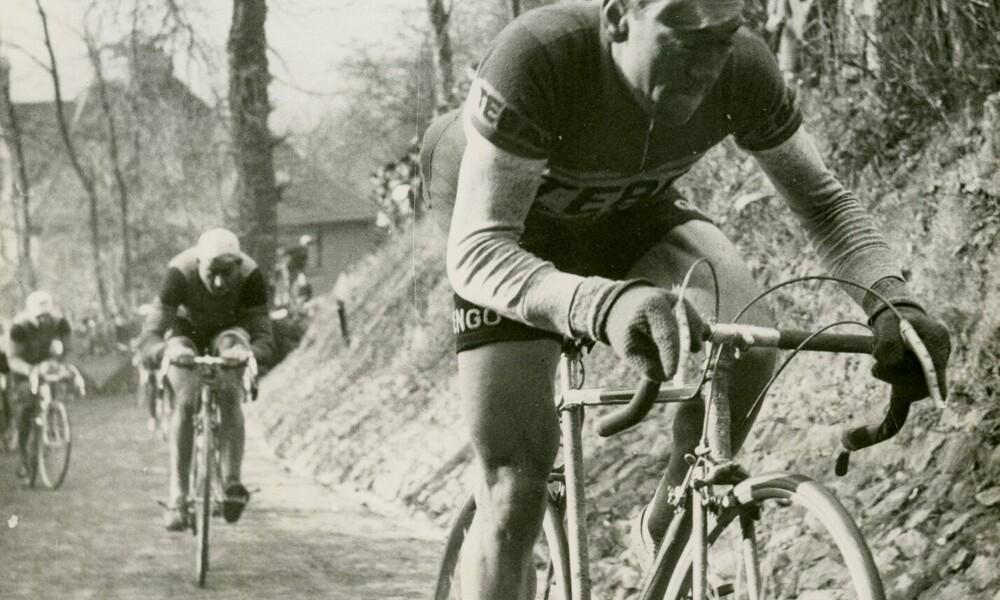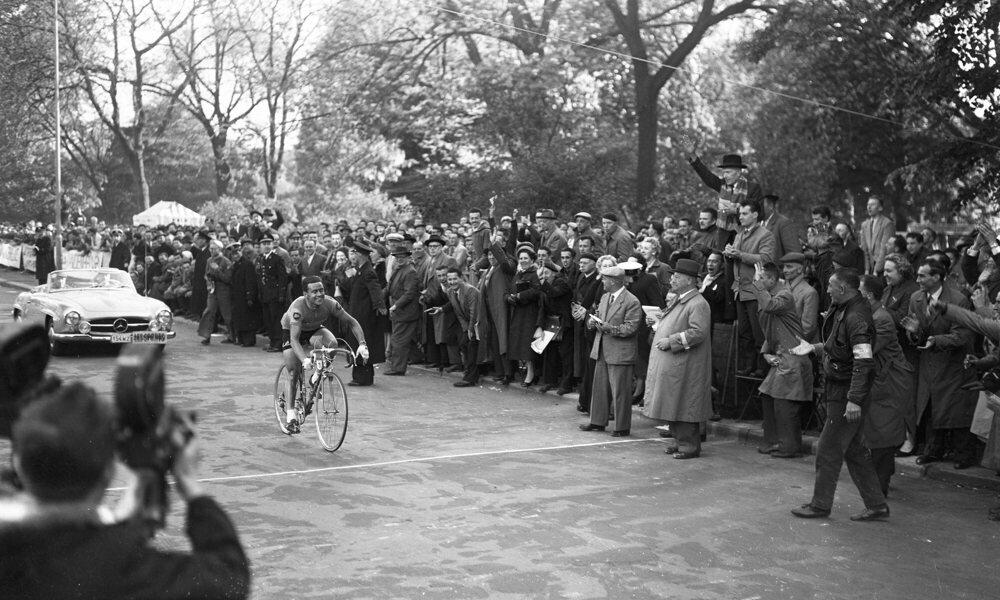Men Elite history
Results 2025
American rider Neilson Powless has won his first spring classic after a thrilling sprint against Wout van Aert. After riding at the front for 54 kilometres alongside three Team Visma | Lease a Bike riders, he kept his cool in the finale and finished it off in Waregem. He succeeds Matteo Jorgenson as the winner of Dwars door Vlaanderen.
No race
Record holders
No less than 14 riders have won Dwars door Vlaanderen twice in their careers. Yet there is only one rider who managed that feat two years in a row: Yves Lampaert.

André Rosseel was the first rider in the history of Dwars door Vlaanderen, then Dwars door België, to win the race twice. In 1948, Rosseel succeeded ahead of Florent Mathieu. In 1950, two years later, Rosseel became the race’s record holder.

In 1951, one year after André Rosseel’s second victory, Dwars door Vlaanderen got a second record holder in the form of Raymond Impanis. In 1949, Impanis was stronger than Lionel Van Brabant. Two years later, he defeated Marcel Hendrickx.

Briek Schotte, who for years lived in the Waregemse borough of Desselgem, succeeded in winning Dwars door Vlaanderen twice in the early 1950s. In his first victory, in 1953, Iron Briek proved stronger than the Dutchman Adri Voorting. Two years later, Schotte made it ahead of Alfred De Bruyne.

In the late sixties, Walter Godefroot celebrated victory twice in Dwars door Vlaanderen. In 1966 he was the best ahead of Willy Bocklant and the Dutchman Peter Post. Two years later, the podium was entirely Belgian. Godefroot won ahead of Willy Monty and Bernard Van De Kerckhove.

Daniel Van Ryckeghem succeeded in winning Dwars door Vlaanderen twice as rider with Dr. Mann – Grundig. In 1967, he celebrated for the first time in Waregem. In 1970, he beat Eric Leman.

A year after brother Willy, Walter Planckaert won Dwars door Vlaanderen for the first time in 1977. In a two-man sprint, he showed himself to be the better of Luc Leman. In 1984, Walter was again the best in Waregem. After a four-man sprint, he was crowned co-record holder of the race.

In 1986, Eric Vanderaerden took his place at the top of the podium of Dwars door Vlaanderen. In an elite group of ten, the Belgian from Panasonic was faster than Adrie van der Poel. Five years later, Vanderaerden joined the list of record holders by defeating the Germans Uwe Raab and Remig Stumpf.

After a fine solo, Jelle Nijdam was crowned winner of Dwars door Vlaanderen for the first time in 1987. The Dutchman from the team Superconfex - Kwantum, had a 53-second lead over the trio Herman Frison, Sean Kelly and Jean-Marie Wampers. No less than eight years later, Nijdam won the race for a second time. Tom Steels and Adriano Baffi accompanied him on the podium that year.

Johan Museeuw also won Dwars door Vlaanderen twice. The Lion of Flanders won for the first time in 1993. That year, he beat his GB-MG Maglificio teammate Franco Ballerini in a two-man sprint. Museeuw also managed to win a two-man sprint six years later. In 1999, Michel Vanhaecke lost.

Tristan Hoffman won Dwars door Vlaanderen for the first time in 1996. Then, the TVM – Farm Frites rider was the fastest in a group of four. He beat Edwig Van Hooydonck in the sprint. Four years later, he sprinted to victory again. This time, he beat the likes of Peter Van Petegem and Lars Michaelsen in a larger group.

‘Rambo’ was the nickname of Niko Eeckhout in the peloton. The Belgian owed his name to his phenomenal performance during Dwars door Vlaanderen 2001. In a rain-soaked edition, Eeckhout attacked with his teammate Thierry Marichal a few kilometres after the start. With more than 50 kilometres to go, Marichal’s legs could give no more, but Eeckhout continued on. After an attack of 201 kilometres, he arrived solo in Waregem. Four years later he succeeded in winning Dwars door Vlaanderen for a second time. Then he was the fastest in a group of eight.

Niki Terpstra’s first victory was one that won respect. The Dutchman attacked thirty kilometres from the finish line and arrived solo. He beat his teammate Sylvain Chavanel and compatriot Koen de Kort by 47 seconds. In 2014, he won again by managing to stay ahead of a sprinting peloton.

In Dwars door Vlaanderen 2017, there was little that could be done about the supremacy of Quick-Step Floors. Yves Lampaert finished off an excellent team performance. He attacked seven kilometres from the finish and soloed to victory. A year later, Lampaert won again. In a very wet edition, he crept away from a leading group before again finishing solo.

In 2019, Mathieu van der Poel competed in a number of the spring classics for the first time. The Dutchman could quickly taste success in Dwars door Vlaanderen. In Waregem, he was the fastest in a group of 5, ahead of Anthony Turgis and Bob Jungels. After a winter full of injuries, Van der Poel was at the start of Dwars door Vlaanderen in 2022. On the Verbindingsweg he sprinted away from Benoot and succeeded in winning again.














